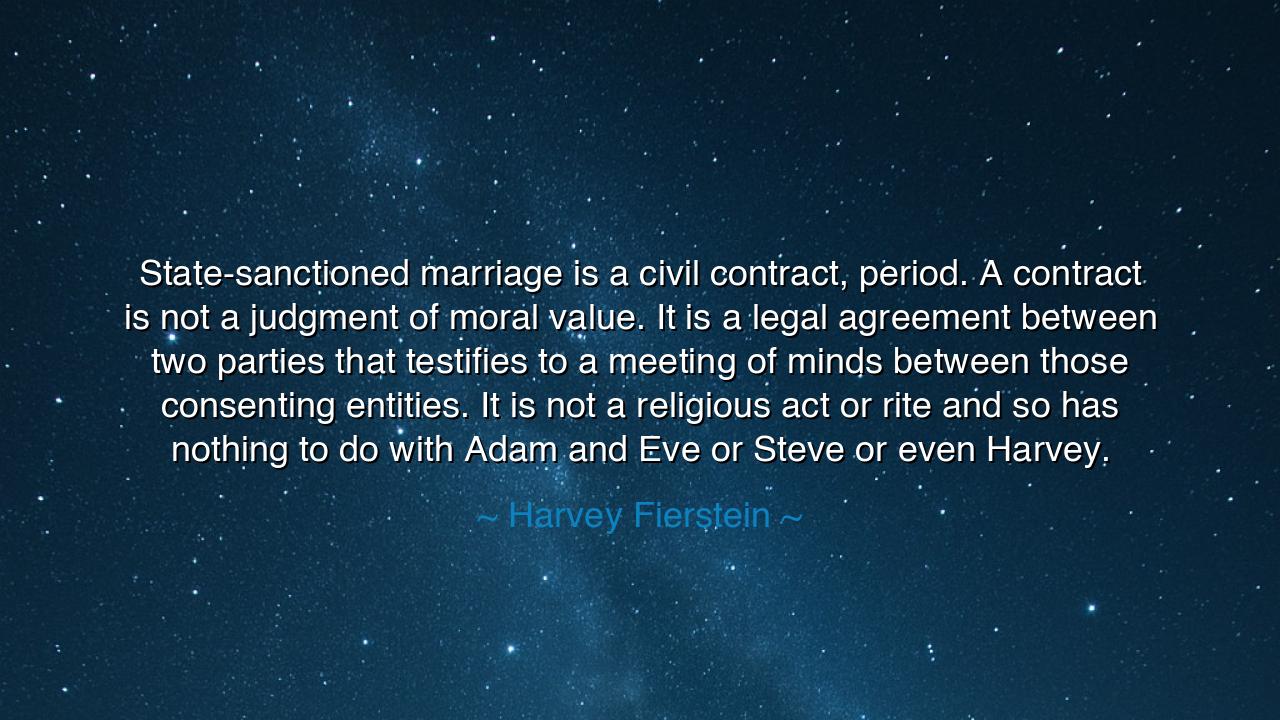
State-sanctioned marriage is a civil contract, period. A contract
State-sanctioned marriage is a civil contract, period. A contract is not a judgment of moral value. It is a legal agreement between two parties that testifies to a meeting of minds between those consenting entities. It is not a religious act or rite and so has nothing to do with Adam and Eve or Steve or even Harvey.






Hearken, O seekers of truth, to the words of Harvey Fierstein, whose voice—bold, unyielding, and filled with the fire of reason—spoke thus: “State-sanctioned marriage is a civil contract, period. A contract is not a judgment of moral value. It is a legal agreement between two parties that testifies to a meeting of minds between those consenting entities. It is not a religious act or rite and so has nothing to do with Adam and Eve or Steve or even Harvey.” Within these words lies a teaching both profound and practical: the difference between law and faith, between the authority of the state and the sanctity of personal belief.
Since the dawn of human society, the institution of marriage has worn many garments. Among the ancients, it was an alliance of families, a transaction of lineage, a structure of property and inheritance. In Rome, marriage was a contract, written and witnessed, ensuring the continuity of citizens and estates. In the temples of the East, it was a sacred covenant, sanctified by ritual. But as civilizations grew and laws evolved, the state began to recognize marriage as a civil act—a legal agreement, enforceable and defined not by gods or priests, but by the law of humankind. Fierstein’s declaration calls us back to this root: marriage, as sanctioned by government, is a matter of civic recognition, not divine ordination.
His words arise from the long and passionate struggle for equality in the modern age, especially for gay couples seeking the same legal standing as their heterosexual counterparts. For centuries, religion and law were intertwined, each claiming dominion over love and union. But as society advanced, thinkers, reformers, and activists began to separate what belongs to conscience from what belongs to governance. Fierstein’s statement, therefore, is both a challenge and a revelation: to remind the world that the legal system exists to ensure fairness—not to enforce theology.
Consider the tale of Loving v. Virginia (1967), where an interracial couple, Richard and Mildred Loving, faced imprisonment for their marriage under state law. Their courage and appeal to the Supreme Court shattered legal segregation in marriage, affirming that civil contracts cannot be governed by prejudice or faith-based morality. Decades later, the same principle guided the decision of Obergefell v. Hodges (2015), which recognized same-sex marriage as a constitutional right in the United States. In both cases, the courts reaffirmed what Fierstein declared: that marriage, in the eyes of the state, is not a moral verdict—it is a legal right.
Fierstein’s tone carries both defiance and clarity. By rejecting the invocation of “Adam and Eve or Steve or even Harvey,” he strips away the moral and theological debates that have long clouded the public discourse. His argument is not against religion, but against confusion: the idea that the state’s recognition of a contract is somehow equivalent to a moral or spiritual judgment. The law exists to protect all citizens equally, whether their beliefs align with majority faiths or not. In that equality lies the moral strength of democracy itself.
The essence of his teaching is this: when the state recognizes a marriage, it does not sanctify love—it secures rights. It ensures inheritance, healthcare access, property, custody, and decision-making power. These are the pillars of civic protection, the everyday shields that guard human dignity. To deny them to some, on grounds of moral disdain, is to violate the principle that law serves all and privileges none. Fierstein’s wisdom reminds us that fairness in the public square depends upon the clear boundary between belief and governance.
O seekers of understanding, let this truth take root in your hearts: moral virtue cannot be legislated, and love cannot be confined by creed. The state must deal in equality; faith must dwell in the heart. One protects the body, the other nourishes the soul. The health of civilization depends upon their balance. Fierstein’s words call upon us to preserve that balance—to guard against those who would dress discrimination in sacred robes, and to remember that the law must stand impartial, firm, and free.
Take this teaching into your daily life: defend the separation between moral judgment and civil right. Support the legal protection of all unions founded on consent and commitment, regardless of creed or gender. For in upholding the civil contract, you uphold not just the law, but the ancient and eternal idea that justice belongs to everyone who walks beneath the sun. Thus the wisdom of Fierstein becomes a guiding torch: law is the language of equality, and equality is the truest expression of love.






AAdministratorAdministrator
Welcome, honored guests. Please leave a comment, we will respond soon